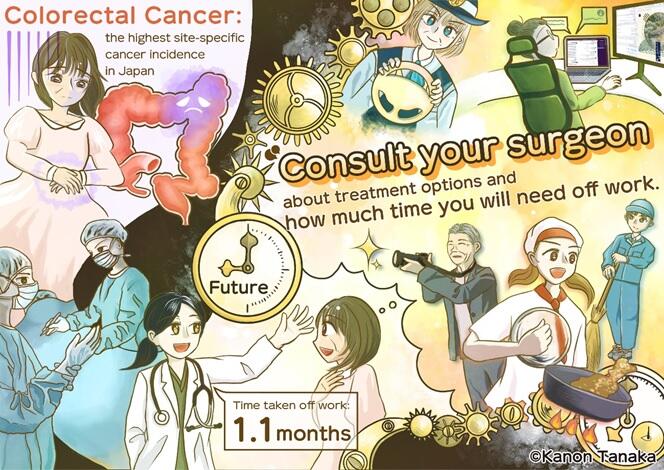A research group led by Assistant Professor Yusuke Fujita and Associate Professor Koya Hida of the Graduate School of Medicine at Kyoto University conducted a survey on the post-operative working status of 129 patients with colorectal cancer at seven medical institutions. The group demonstrated that the median time for the patients to return to work after surgery was 1.1 months. The proportion of patients who were working one year after surgery was relatively high (79.2%). Factors preventing return to work included a stoma, postoperative complications, non-regular employment preoperatively, and lower income. The study results are expected to facilitate smooth treatment progress by sharing information from the findings with patients. The study was published in the September 8, 2023 issue of Diseases of the Colon and Rectum.

Provided by Kyoto University
Among cancer types by location, colorectal cancer has the highest number of cases in Japan. However, because the results of treatment for colorectal cancer have improved, its five-year survival rate is reported to be approximately 70−90%. In studies of cases outside Japan, their return-to-work rates and time to return to work after diagnosis or surgery are reported to be 49−89% and 2.2−9.1 months, respectively. Factors that hinder returning to work after surgery are reported to be 'older age,' 'comorbidities,' 'postoperative complications,' and 'lower income.'
In Japan, such a study had not been performed. Therefore, the research group conducted this study aiming to understand the working status after surgery and factors hindering work resumption for patients in Japan with colorectal cancer.
A questionnaire survey was administered in one university hospital and six community hospitals between June 2019 and August 2020, targeting patients with stage I−III colorectal cancer who were scheduled to undergo radical surgery while being employed at the time of diagnosis. Follow-up surveys were carried out at six months and one year post-surgery.
A total of 129 patients were included in the study. Of the patients, 50 patients (39%) were aged 65 years or older, 46 patients (36%) were females, 9 patients (7%) had neoadjuvant chemotherapy, 31 patients (24%) had stoma construction, 27 patients (21%) had a postoperative complication, and 7 patients (5%) had a postoperative complication ≥Grade 3. Further, 44 patients (34%) had a cancer diagnosis of the pathological stage III or IV, and 50 patients (39%) had undergone adjuvant chemotherapy. Moreover, 126 patients (98%) had minimally invasive surgery.
Among 89% of the patients who expressed their intention to return to work, the numbers who answered 'strongly intend' or 'intend' to return to work were 78 and 37 patients, respectively. The questionnaire also included items on working hours and employment types.
The median time from the patients' surgery to return to work was 1.1 months. No difference in the results were observed between patients aged 65 years or older and those who were younger. The proportions of patients who went back to work six months and one year after surgery were 81.3% and 79.2%, respectively. However, patients with a stoma required 2.3 months to return to work, and those who had a severe postoperative complication required 3.7 months. Moreover, risk factors for delayed work resumption and unemployment one year after surgery were investigated.
The results showed that diagnoses of clinical stage III, a stoma, and a postoperative complication ≥Grade 3 were risk factors for delayed returning to work, and a stoma and lower individual income were risk factors for unemployment one year after surgery.
Fujita stated, "We are currently conducting similar surveys for gastric and esophageal cancers. Because these types of cancer have an effect on diet, we expect different survey results according to cancer types. We also expect that we will gain new findings from a qualitative assessment of free-text answers to questions included in these questionnaires."
Journal Information
Publication: Diseases of the Colon & Rectum
Title: Employment Status of Patients With Colorectal Cancer After Surgery: A Multicenter Prospective Cohort Study in Japan
DOI: 10.1097/DCR.0000000000002840
This article has been translated by JST with permission from The Science News Ltd. (https://sci-news.co.jp/). Unauthorized reproduction of the article and photographs is prohibited.




